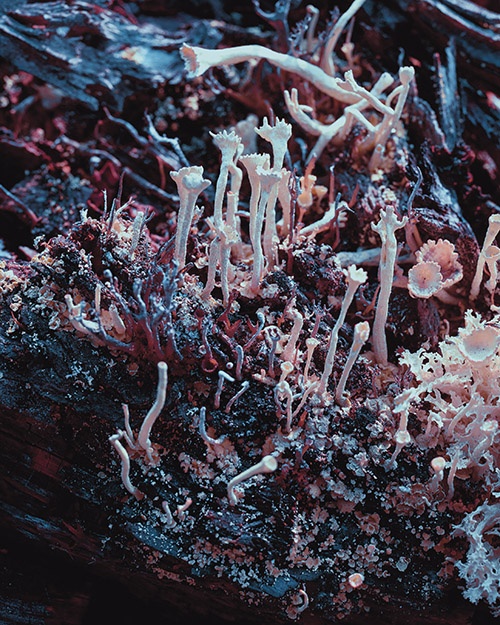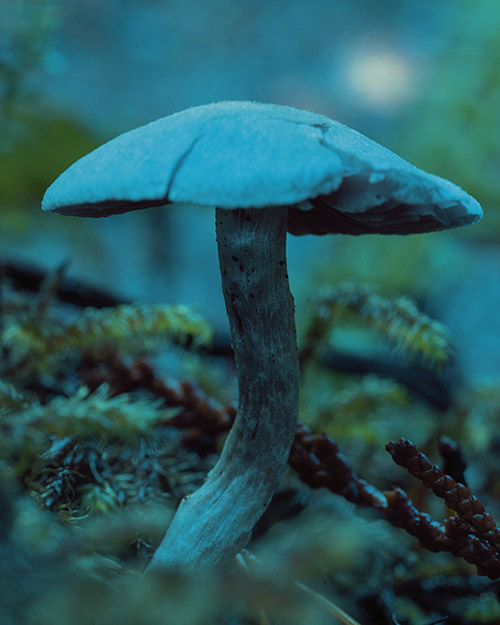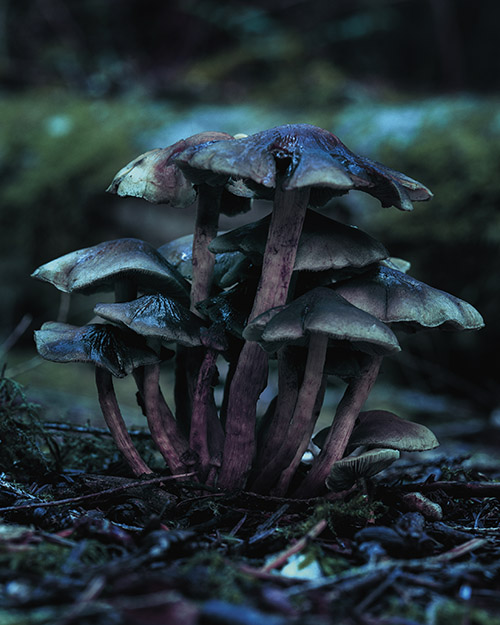 Photographs by Brendan George Ko
Photographs by Brendan George Ko
Mycelium Ghost
The first time I hear the ghost, I’m sixteen years old and keeping watch of the road leading up to the abandoned barn my mother is scavenging through. High summer on the prairies means that it’s a dry hot, even when you’re in the shade. The scent of pine and sap sticks to our clothes and the wind blowing through the field across from us ripples the canola into ocean waves.
We have signals for if I see a car coming, and a rehearsed story of nehiyaw iskwewak who have lost their way in their own homelands if anyone comes upon us. We’ve been working our way through the prairies, scavenging through empty homes and barns since as far back as I can remember. Our trips would always start before the break of dawn. I would wake in the darkness of our house to the apparition of a body, an image floating above my head.“It’s me, my girl,” mom would whisper, brushing hair out of my face, her calloused fingers resting on my shoulder. In the dim light peeking through the window, I’d make out more of her: the sharp outline of her face, her open mouth.
We’d get into the truck in silence, the air still holding cold from the night before, and drive in what seemed like no particular direction, though mom always knew where we were going. For hours we’d listen to the static radio until we’d come upon an old building, or it would come upon us. Sometimes mom would drive through fields to get to where she saw, for a split second, a roof between tree branches. She’d take gravel roads and trails not meant to be driven on. Sometimes she would open up a locked gate with bolt cutters, or take down a cracked wooden fence if there were no animals that could get out.
Though we’d been doing these trips forever, we used to only go out a couple times a year. But since kokum died last winter and a hole was shot through the world, we started going more and more. At the first thaw of spring, we’d go out two or three times a week, driving into every corner and crack of Treaty 8 and to houses empty of people.
Mom would go through all the abandoned furniture, toys, tools and clothes left behind while I stood watch. She’d disappear and come back with an old chair, an ironing board, a broken picture frame. I never understood why she chose to keep the things she did. Mom could look at something broken and rusted and see what it could be after she took it home and washed it, gave it a new face. That was mom’s gift: she saw things for their future. She could fix the broken, make them whole again. These projects were sprinkled through our garage and kept her busy all year. If I have any clear memory of my mom at any time, it’s with a half-broken object in her hand, sanding it, painting it, making it new again.
At first, when I hear the ghost, I think it’s just mom moving something around in the barn. It comes in a quiet shuk shuk shuk and takes my attention away from the road. The barn’s eyes are big enough to see through, the sagging roof on one side opens up to the sky. In its open-mouthed face, I can hear my mom, talking half to me and half to herself as she wades through other people’s things inside. The sound, though, the unrelenting shuk shuk shuk, comes in steady from behind the building, closer to the woods.
As I round the corner of the barn, the sound stops. A patch of clearing between the back of the barn and the tree line lies silent except for the sound of prairie summer: buzzing bees, a swallow or two calling from the woods. A lone stump sits in the clearing, a tree chopped down years ago. Icicle-like fungi cover the stump like a growth. Bear’s head tooth mushroom. The white, fleshy spines look like they’re dripping in reverse: growing up from the ground and falling into the sky. They only grow on dead or dying wood, are edible if you cook them down first. A sinking feeling deepens in my gut, like I’m forgetting something.The thunking sound. I know I’ve heard it before. I leave the stump mushroom and find mom inside the barn holding a dress form with bullet holes through the stomach. “We can make her new again,” she says and I nod. The thunking sound reverberating only in my head and nowhere else.

The second time I hear the ghost, I’m in the kitchen doing the dishes. It’s only a week after the first time, so the memory is still fresh in my gut. Mom, dad and the aunties are watching TV in the living room, their roaring laughter floating through the house like spores. Shuk shuk shuk. The sound comes from outside, away from the noise of everyone else. When I look out the kitchen window, I see a light turn on in the garage and a shadow move against the walls.
Hands still soaking and barefoot, I follow the sound across our small yard and into the garage. The smell of stale air and paint drifts into my nose and I’m surprised at how much the garage has filled since the last time I was in here. The extra scavenging trips have created piles and piles of scrap. Some of the pieces mom has started refurbishing, but all of them are unfinished, simply transferred from one empty place to another. The shuk shuk shuk is louder in the garage, the cement floor doing nothing to absorb the sound. I climb carefully through the piles, mindful of the rusted nails and screws jutting from pieces of broken wood, searching for the sound until, like a slap in the face, I remember where I’ve heard it before.
As a kid, almost every night, kokum, mosum, mom and dad, and aunties and uncles would gamble together. Play poker until the sun stretched up from the night into morning. No matter where they were—my parents’ house, an aunt’s, kokum’s trailer—they’d play. All they needed was a table and a deck of cards.
Kokum was all teeth. Her real teeth rotted out as a kid, so she got dentures early in her life. They were too big and too white for her mouth, but I fell in love with them. How they moved to the sound of the room. She used to call them her weapon. “Stronger than regular teeth,” she would say. “Can bite right through bone. Don’t ask me how I know.” Her party trick was putting them in our water cups when we weren’t looking. Laughing when we’d spot the pieces of enamel staring back as we put our lips to the glass.
Kokum always kicked off the poker nights. She’d disappear down the hall and then we’d hear it: the rattle of coins she kept in the Player’s tobacco tin. She’d shake it as she walked down the hallway. Shuk shuk shuk. Nice and slow, a signal and a warning. That gave mom and the aunties enough time to move the kids to the living room where blankets on the floor made our beds. Shuk shuk shuk. Just enough time for mom to grab a worn-out deck of cards from the kitchen drawer.
Kokum would stroll into the kitchen shuk shuk shuk shaking the tobacco tin. She’d put on her cowboy hat with the leather band that wrapped around twice, held in place by a silver buckle. A glint from the metal would cast beams of light on the ceiling as she’d tip the hat over her eyes. She’d put the tin of change next to her, pull out quarters and loonies for her buy-in. She would be the resident banker for the house, trading in everyone’s bills for coins so they could play too, keeping stock of who owed what.
My cousins and I would watch from pretend sleep while the kitchen filled with cigarette smoke and the boom of laughter, listen to the flip and shuffle of cards, glasses filling with liquid, the slap of hands on the table as they’d win or lose hands. We’d watch as a grocery bag full of dry meat got passed around the table through the din, hands stretching over the table to dip in a brick of butter. Slivers of dry meat would be left behind, sticking out at all angles. They’d smoke and tap cigarettes into a clay cup, ash growing through the hours like snowfall in winter. Instead of sleeping, us kids would listen and learn how to play poker, black witch, rummy. We’d recite all the good and bad jokes to each other, copy how the adults threw their heads back in wide-mouthed laughter, try to guess how much of a fortune could be in kokum’s tobacco tin that started and ended the night.
The shuk shuk shuk in the garage pulls me out of the memory and I spot the mushrooms. In a musky, shadowed corner, a box of soggy books sits against the wall, remnants from the spring thaw. The mushrooms grow off the open pages of a book, the white bulbous flesh forming a clump. Whiter than the yellowing pages where they’ve made their home, the cratered heads look like skulls. As soon as I spot them, the noise stops. But then I smell kokum, too: cigarette smoke and coffee waft up from the fungi bones.
It’s after this night that the dreams start. Every night I dream of moving through roots and tunnels. As I move, fireworks go off around me like synapses in a brain. When I wake up, I can still smell the dirt and mud from underground.
Eventually, the garage gets too full with rescued goods. It bulges and then explodes, like a dead skunk’s bloated stomach when it’s left out in the sun too long. But mom doesn’t let up. We start scavenging five days a week. When it feels like we’ve run through every barn, abandoned shed and house in all our homelands, we move on to homes still occupied by people. “They’re abandoned too,” mom says. “The people just haven’t left yet.” She still spends every night sanding and staining, desperate to get through it all.
The mushrooms pop up all over the house and garage. All kinds, too: black morel, wasaskwetiw, comb tooth, common puffball, fairy ring. I find them growing from the walls, inside cupboards, full and bright in the middle of our kitchen table. The shuk shuk shuk of the coins in the tin fills the house as kokum moves from room to room. For years, I try to catch her, climbing over broken chairs and lamps to follow the sound, only to have it disappear and reappear somewhere across the house again. Leaving me standing in a room full of my mother’s need and with a new mushroom I haven’t seen before.
It’s my mom who finally catches her. Shuk shuk shuk. I wake up in the dead of night to the sound of the coins, the smell of Player’s blues, the cackle of laughter and a slap of a hand on a table, someone flourishing a straight to beat a three of a kind. Shuk shuk shuk. I rub the sleep from my eyes and get up, tunnel my way through abandoned wreckage from my room into the hallway. The shuk shuk shuk gets louder as I near the bathroom. I swing the door open and wait for the sound to disappear, as it always does, moving through mycelium to a different part of the house. But it stays. The sound of shaking coins echoes in the acoustics, reverberating off the tile walls. When I turn on the light, it flickers and then glows, like it’s deciding whether to stay or leave.
Mom stands there, blinking as if she’d just woken up, too. When she sees me, her smile widens into a grin that meets her eyes. “I knew I’d find you,” she says and reaches out for me. I open my mouth to speak but all that comes out is the shuk shuk shuk of shaking coins. As I turn to look into the mirror, I remember all the times I’d heard the sound before. The feel of a hat on my head, tipped just below my eyes. A weight in my arm like a dumbbell. Shuk shuk shuk. Flashes of root and fungi snap before my eyes. Memories of dreams moving through the cold, wet ground. Now I look into the mirror and see myself for the first time. My kokum stares back at me. The tobacco tin rests heavy in the nook of my arm. When I grin, kokum’s too-white teeth smile back. I shake the coins one last time shuk shuk shuk and catch the glint of the silver buckle on my cowboy hat wink goodbye.
Jessica Johns is a nehiyaw aunty with English-Irish ancestry and a member of Sucker Creek First Nation in Treaty 8 territory in Northern Alberta. Her short story “Bad Cree” won the 2020 Writers’ Trust Journey Prize and her novel of the same name will be released in January 2023 with HarperCollins.






